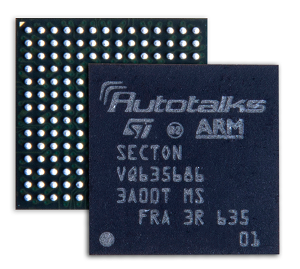Israeli V2X (Vehicle-to-Everything) communication systems developer Autotalks has announced that its 2nd generation chipsets are FIPS certified for secure cellular V2X (C-V2X) or DSRC (Dedicated Short-Range Communications) connected vehicle deployment in the USA.
The announcement comes after Autotalks’ V2X chipsets achieved Federal Information Processing Standard 140-2 (FIPS 140-2) security level 3 certification from the US National Institute of Standards and Technology (NIST). The company’s CRATON2 and SECTON embedded Hardware Security Module (eHSM) is the first V2X HSM to achieve this certification. The FIPS 140-2 certification is a US Government computer security standard that is used to approve cryptographic modules. The US Department of Transportation (USDOT) strongly urges FIPS 140-2 level 3 certification for V2X HSM in order to prevent the theft of security credentials in connected vehicle deployments.
Autotalks’ chipset isolates V2X from the non-safety domains, thus providing domain separation and security, scalability, and cost-optimizations of Telematic Control Unit (TCU) deployments. The embedded HSM exceeds the secure storage size defined by the USDOT’s V2X NPRM (Notice of proposed rulemaking), assures access to secure assets only by authorized processes and includes crypto-agility for future-proof cyber defence. The isolation of V2X, combined with the company’s recognized cybersecurity leadership, enables a truly secure platform. Designed for use in autonomous vehicle deployments, Autotalks’ advanced technology dual-mode DSRC and C-V2X chipsets have worldwide compliance, supporting USA, European, Chinese and Japanese standards, and are used by global OEMs and Tier1s in connected vehicle projects.
“This makes our chipsets the only truly secure C-V2X/DSRC chipsets which are ready for deployment in the USA,” said Yaniv Sulkes, Autotalks’ VP of business development and marketing in North America and Europe. “In the midst of regulatory uncertainty about V2X technology and spectrum in the USA, our solution allows automakers to deploy our secure V2X chipset using either V2X technology, with the option to later change to another technology, thus eliminating risk of wrong technology selection.”





